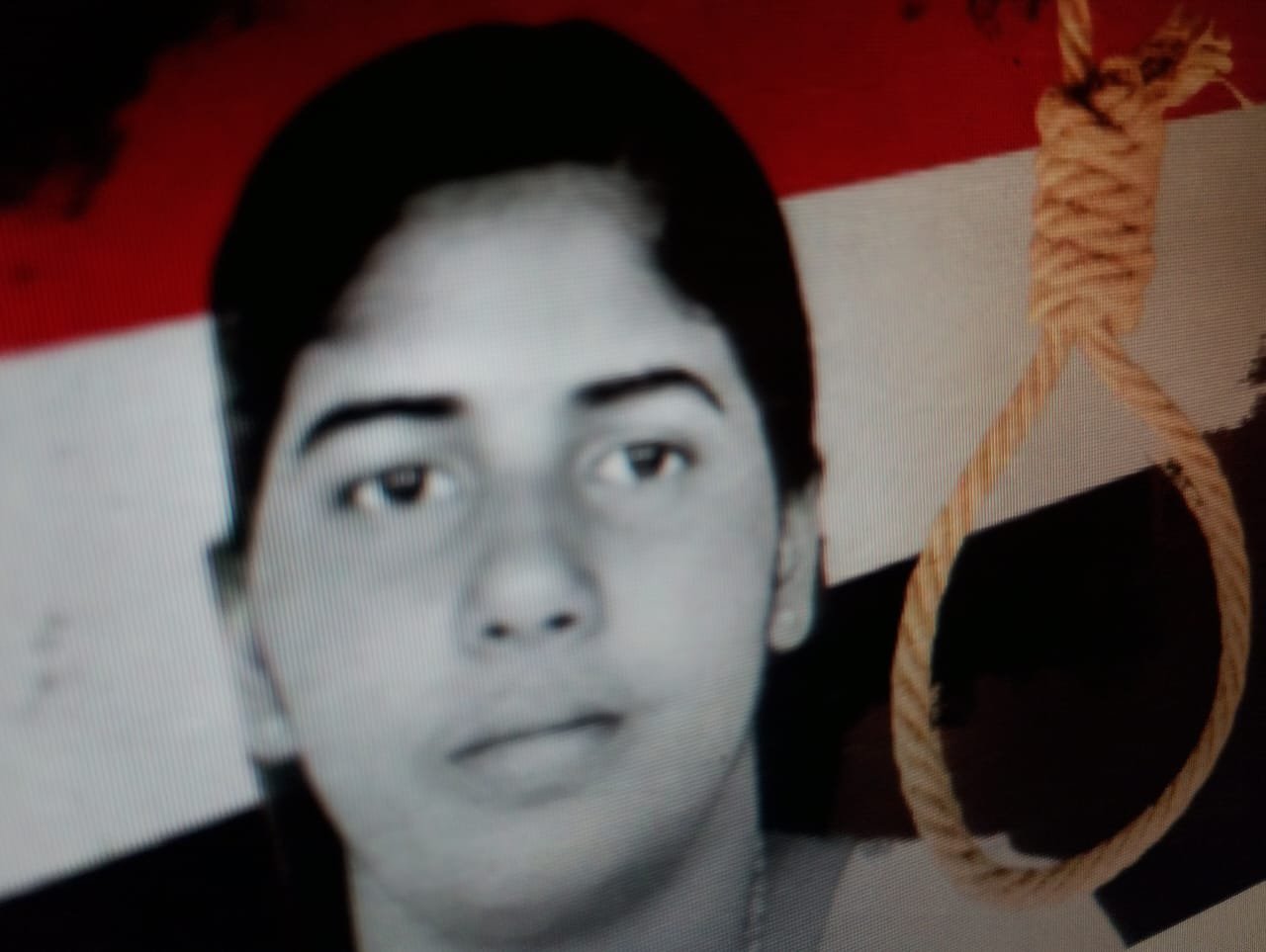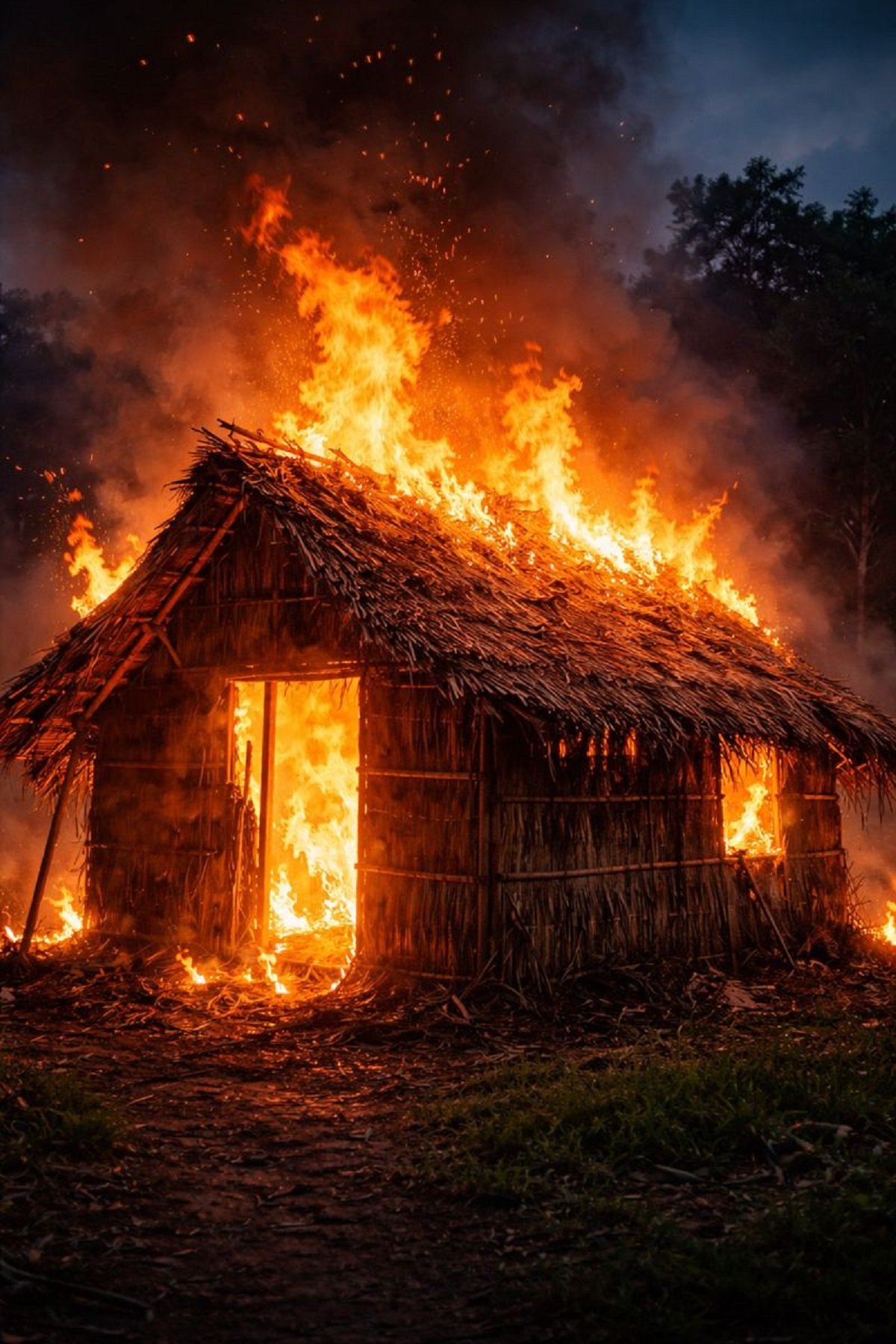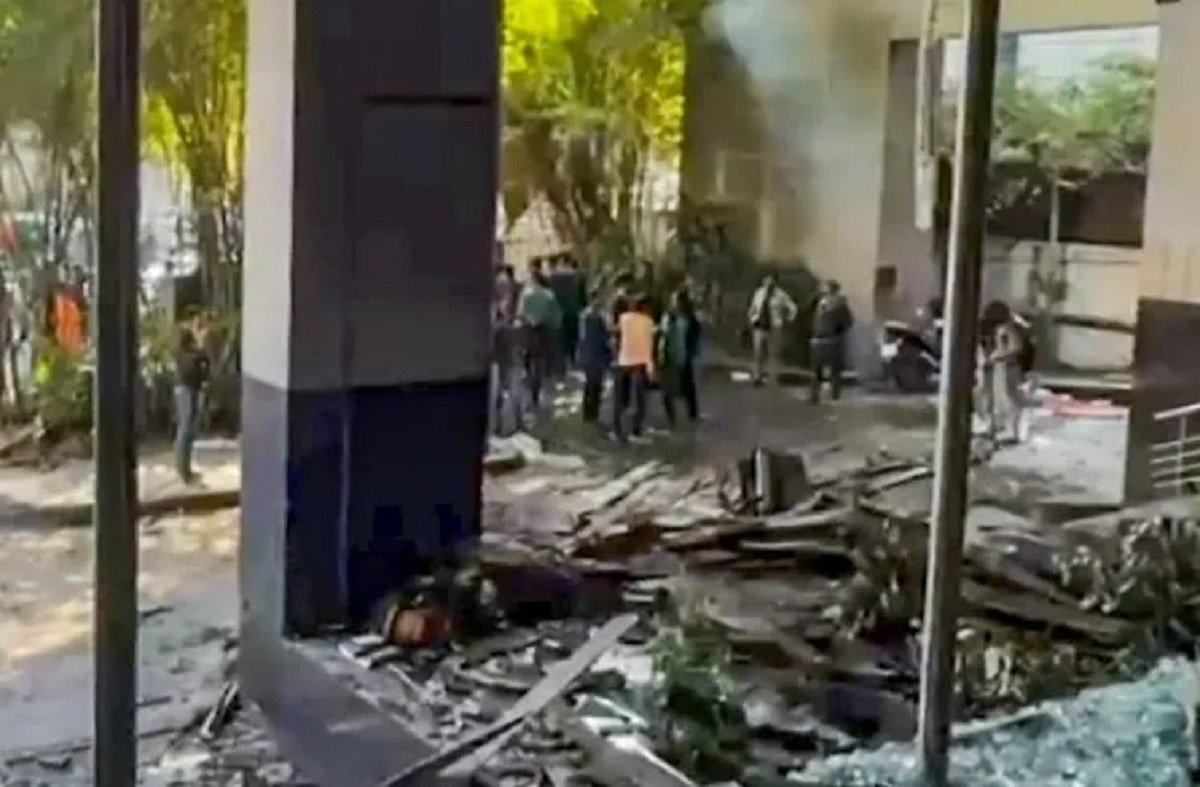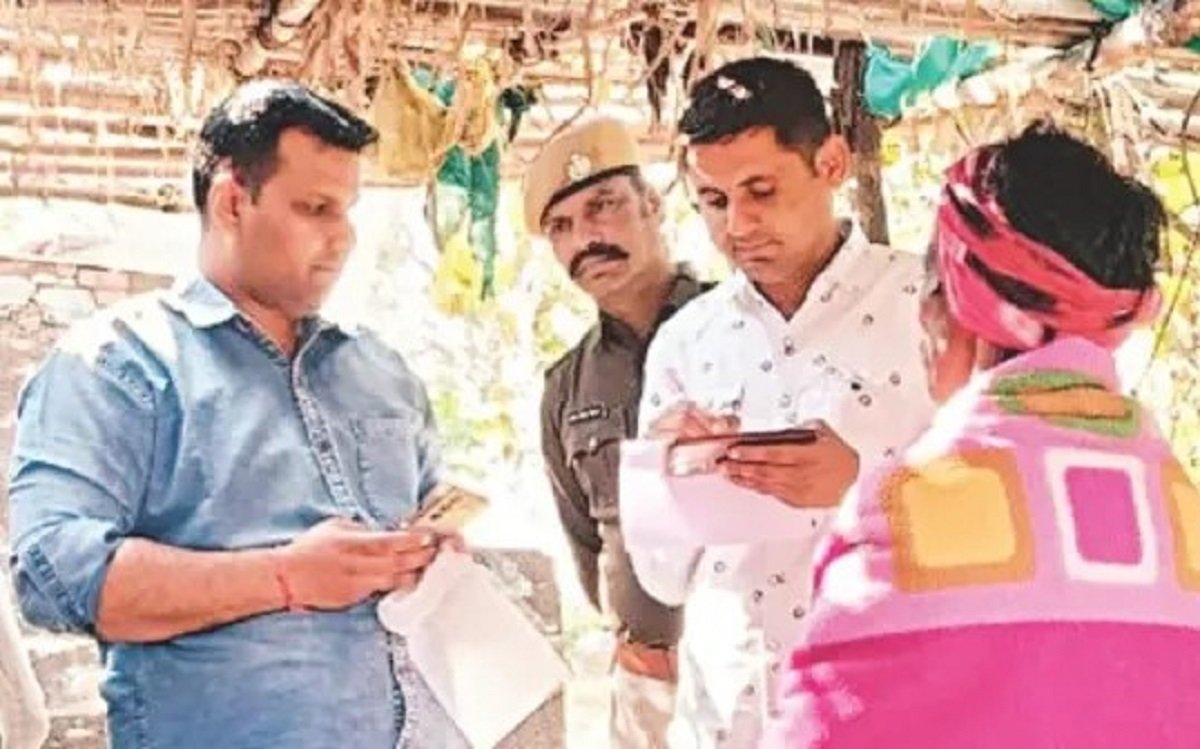Crime
Indian Nurse to Be Hanged in 6 Days in Yemen — The Heartbreaking Story of Nimisha Priya, Who Gave Her Partner a Sedative That Turned Deadly

Contents
Thiruvananthapuram / Yemen | July11, 2025
Once a hopeful young nurse from Kerala, Nimisha Priya is now counting her final days in a Yemeni prison. Her crime — administering a sedative that led to the death of her Yemeni business partner, Alkhader Al-Omari. Her punishment — execution by hanging on July 13, 2025.
But behind this grim sentence lies a story much more complicated — one filled with ambition, control, fear, and a moment that changed everything.
A Nurse with Dreams, and a New Life Abroad
Nimisha Priya wasn’t a criminal when she left India. She was a caregiver — a skilled nurse with dreams of building a better life. In Yemen, she found work, opened a clinic, and partnered with Alkhader Al-Omari, a local man who helped her navigate the foreign land.
But what started as a partnership slowly turned into a prison.
Trapped in a Toxic Relationship
Reports from the time suggest that Al-Omari soon took control of more than just the clinic. He allegedly confiscated Nimisha’s passport, isolated her, and began mentally and physically abusing her. He took over her earnings and threatened her when she talked about returning home to India.
Far from family, friends, or legal protection, Nimisha felt completely trapped — her life and freedom in the hands of a man who, she believed, would never let her go.
The Night It All Changed
Then came that fateful night in 2017.
According to court documents, Nimisha gave Al-Omari a high dose of a sedative. Her stated intention was not to kill him, but to make him unconscious, retrieve her passport, and escape. But the sedative proved too strong — Al-Omari died.
Panic set in. Nimisha reportedly dismembered his body and tried to hide the evidence in a water tank. A gruesome and desperate act that, once discovered, left her no room to explain.
A Death Sentence, and a Race Against Time
The Yemeni court ruled the act pre-meditated murder and sentenced Nimisha to death by hanging.
For years, legal teams in India and Yemen pleaded for clemency. Activists pointed to the abuse she suffered, to the desperation of a woman with no escape, and to her otherwise clean record. Her mother, in tears, begged the Yemeni family for forgiveness, hoping for a “Diya” — blood money — a custom in Yemen that allows the victim’s family to pardon the accused.
But that pardon never came.
Only Six Days Left…
Today, Nimisha Priya is a prisoner not just behind bars, but in time. With just six days left, she awaits her execution. Her mother is still trying — hoping against hope — for one final miracle.
Meanwhile, millions in India are asking:
Was she a murderer? Or a victim of circumstance, trying to survive in a world where no one came to help?
Beyond the Verdict
This is not just Nimisha’s story. It’s the story of thousands of Indian women who work abroad, often with little protection. It’s the story of how desperation can drive someone to the edge, and how the law — especially in foreign lands — rarely leaves room for the grey in between.
Breaking News
Indian Woman Murder in Maryland exposes a chilling cross-border crime as a 27-year-old Indian woman is found dead-

Contents
US,Jan.05,2026:Indian Woman Murder in Maryland has emerged as one of the most disturbing international crime stories of the new year, highlighting the grim reality of relationship-based violence and the complexities of cross-border justice.
A 27-year-old Indian woman, Nikita Godishala, was found murdered inside an apartment in the US state of Maryland. What intensified the shock was the revelation that the prime accused—her former boyfriend Arjun Sharma—had fled to India shortly after the crime. He was later arrested in Tamil Nadu, setting the stage for a high-profile international legal battle.
The case has sparked outrage, grief, and serious questions about the safety of Indian women living abroad.
Who Was Nikita Godishala
Nikita Godishala was a young Indian professional of Telugu origin, living independently in Maryland. According to reports cited by US media and Indian diplomatic sources, she had moved to the United States for higher studies and career opportunities.
Friends describe her as ambitious, warm-hearted, and focused on building a stable future. She had recently ended a relationship that reportedly turned toxic—an aspect now central to the Indian Woman Murder in Maryland investigation.
Timeline of the Indian Woman Murder in Maryland
Understanding the sequence of events is crucial in the Indian Woman Murder in Maryland case.
December 31
- Nikita was last seen celebrating New Year’s Eve.
- Family and friends lost contact with her later that night.
January 1–3
- Concern grew as calls and messages went unanswered.
- Her employer reportedly flagged her unexplained absence.
January 4
- Local authorities conducted a welfare check at her apartment.
- Nikita’s body was discovered inside.
Following Days
- Investigation pointed toward her ex-boyfriend.
- Evidence suggested the accused had already left the US.
Discovery of the Body Inside the Apartment
The most chilling aspect of the Indian Woman Murder in Maryland was that Nikita’s body was found inside her own apartment—an environment that should have been safe.
Maryland police confirmed
- No signs of forced entry
- Evidence of a violent struggle
- Strong indicators that the victim knew her attacker
These findings reinforced suspicions against someone from her close personal circle.
The Accused Ex-Boyfriend
Arjun Sharma, an Indian national, was reportedly in a past relationship with Nikita. Investigators believe
- The relationship had ended recently
- There were unresolved conflicts
- Sharma was among the last known people to meet her
Shortly after the estimated time of death, Sharma allegedly boarded a flight to India—raising immediate red flags in the Indian Woman Murder in Maryland probe.
How Indian Police Tracked Him
In a swift development, Indian authorities arrested Arjun Sharma in Tamil Nadu, following a formal request and intelligence sharing from US law enforcement agencies.
According to Indian police sources
- Immigration data confirmed his entry into India
- Technical surveillance helped trace his location
- He was detained without resistance
This arrest underscores growing US–India cooperation in transnational crime cases.
External Reference:
India–US law enforcement cooperation –
US–India Law Enforcement Cooperation Explained
The Indian Woman Murder in Maryland highlights how modern crime investigations rely on international coordination.
Key mechanisms involved
- Mutual Legal Assistance Treaties (MLAT)
- Intelligence sharing between FBI and Indian agencies
- Diplomatic coordination via Indian Embassy in the US
Such cooperation ensures suspects cannot evade justice by crossing borders.
What Investigators Say About the Indian Woman Murder in Maryland
While officials have withheld sensitive details, investigators have indicated
- Strong circumstantial and digital evidence
- Travel records matching the crime timeline
- Communication data linking the accused to the victim
Authorities have labelled the case as domestic-relationship-driven homicide, a category increasingly seen in global crime data.
Rising Safety Concerns for Indian Women Abroad
The Indian Woman Murder in Maryland has reignited debates on safety for Indian women living overseas.
Key concerns include
- Isolation in foreign countries
- Limited immediate family support
- Difficulty accessing local help systems
According to global crime studies, women migrants are disproportionately vulnerable to intimate-partner violence.
Legal Process Ahead
The next phase of the Indian Woman Murder in Maryland case involves complex legal proceedings.
Possible scenarios
- India may extradite Sharma to the US
- Trial may proceed under US criminal law
- Diplomatic and legal reviews could take months
Extradition decisions depend on treaty terms, evidence strength, and court approvals.
Reactions From Family, Community, and Officials
Nikita’s family has demanded
- Swift justice
- Maximum punishment for the accused
- Stronger safeguards for Indians abroad
Indian and US officials have expressed condolences and assured full legal support.
Community groups in Maryland have held vigils, remembering Nikita as a symbol of lost potential.
Lessons From the Indian Woman Murder in Maryland
The case leaves behind sobering lessons
- Ending relationships can be dangerous without support
- Early warning signs of abuse must be taken seriously
- Cross-border criminals can no longer easily escape justice
The Indian Woman Murder in Maryland stands as a tragic reminder that emotional violence often escalates into physical harm.
The Indian Woman Murder in Maryland is more than a crime story—it is a wake-up call for families, governments, and communities worldwide.
As investigations progress and legal processes unfold, Nikita Godishala’s case has already exposed uncomfortable truths about relationship violence, migrant vulnerability, and the urgent need for better protective systems.
Breaking News
Tirupati Govindarajaswamy Temple Security Breach-

Contents
Tirupati, Jan.03,2026:The Tirupati Govindarajaswamy Temple Security Breach occurred late Tuesday night at the historic Sri Govindarajaswamy Temple, located in Tirupati city, Andhra Pradesh. The temple is under the administrative control of Tirumala Tirupati Devasthanams (TTD) and witnesses thousands of devotees every day.
According to officials, a man in an intoxicated state entered the temple premises by jumping the compound wall and climbed the gopuram near the Mahadwaram, damaging two sacred kalashas installed at the top.
What Happened Inside the Temple Complex
The incident reportedly took place around 10 PM, shortly after Ekanta Seva, a time when the temple premises are relatively quiet and closed to devotees.
Security personnel were stunned when they noticed unusual movement near the gopuram. Before guards could intervene, the man had already climbed the structure, creating panic among temple staff.
The Tirupati Govindarajaswamy Temple Security Breach immediately triggered alerts to local police and the fire department.
Timeline of the Shocking Night Incident
- 9:45 PM – Ekanta Seva concludes
- Around 10 PM – Accused jumps compound wall
- 10:15 PM – Man climbs gopuram near Mahadwaram
- 10:30 PM – Temple administration alerts police
- 11 PM – 1:30 AM – Rescue operation continues
- After 1:30 AM – Accused safely brought down
The prolonged standoff intensified anxiety among officials and nearby residents.
Damage to Sacred Kalashas Explained
Once atop the gopuram, the accused allegedly attempted to tamper with the sacred kalashas, which hold immense religious significance in Hindu temple architecture.
Officials confirmed that two kalashas were partially damaged, though no permanent structural harm occurred.
Temple priests later performed purification rituals, as per tradition, to restore sanctity.
Who Is the Accused
Police identified the accused as Kuttadi Tirupati, a resident of Kurma Wada, Pedda Malla Reddy Colony, in Nizamabad district, Telangana.
According to preliminary investigation
- He was heavily intoxicated
- He refused to climb down
- He demanded alcohol during negotiations
The Tirupati Govindarajaswamy Temple Security Breach took an even stranger turn when the accused allegedly shouted that he would not come down unless given liquor.
Three-Hour Joint Rescue Operation
Given the risk of injury or death, Tirupati East Police and the Fire Department launched a joint rescue operation.
Key Rescue Measures
- Iron ladders installed
- Ropes used to secure the accused
- Negotiation tactics employed
After nearly three hours, the man was safely brought down without casualties, preventing what could have been a tragic accident.
Police Statements and Legal Action
Tirupati East DSP Bhaktavatsalam confirmed that a detailed investigation is underway.
The accused has been booked under:
- Trespassing
- Causing damage to religious property
- Public nuisance
Impact on Devotees and Religious Sentiments
The Tirupati Govindarajaswamy Temple Security Breach deeply hurt the sentiments of devotees across Andhra Pradesh and Telangana.
Many worshippers expressed shock that:
- A drunk individual could access a sacred structure
- Surveillance failed during night hours
- Response time allowed prolonged disruption
Social media also witnessed strong reactions demanding accountability.
Temple Security Under Scanner
The incident has exposed gaps in
- Perimeter fencing
- CCTV monitoring
- Night patrol staffing
TTD officials acknowledged the lapse and assured corrective steps.
Past Incidents at Religious Sites
Across India, similar security breaches at temples and shrines have raised alarms:
- Unauthorized climbing of temple structures
- Acts of vandalism under intoxication
- Delayed emergency response
Experts say rising urban footfall and insufficient manpower increase risks.
What Authorities Plan Next
After the Tirupati Govindarajaswamy Temple Security Breach, officials are considering:
- Strengthening compound walls
- Upgrading CCTV systems
- Increasing night security personnel
- Installing motion sensors
DSP Bhaktavatsalam confirmed that preventive strategies are being reviewed to avoid repetition.
Faith, Safety, and Accountability
The Tirupati Govindarajaswamy Temple Security Breach serves as a serious reminder that religious sanctity must be protected not only through rituals but also through robust security planning.
While no lives were lost, the incident underscores the urgent need for vigilance at sacred spaces that hold deep emotional and spiritual value for millions.
As investigations continue, devotees hope this shocking episode leads to lasting reforms — ensuring that faith remains safe from negligence.
Breaking News
Tamil Nadu Hut Fire Murder Case-

Contents
Tamilnadu,Jan.03,2026:The Tamil Nadu Hut Fire Murder Case occurred in Pakkiripalayam, a small village near Chengam in Tiruvannamalai district. A makeshift hut located in agricultural fields was found completely gutted by fire early Friday morning.
Inside the charred remains lay the burned bodies of P. Shaktivell (53), a farmer, and S. Amirtham (40), his live-in partner. Initial findings suggest the hut was deliberately set on fire after being locked from outside, leaving the couple trapped with no escape.
What Happened in Pakkiripalayam Village
According to villagers, the calm of early morning was shattered by the strong smell of burnt material. When locals rushed toward the fields, they discovered the hut reduced to ashes.
The Chengam Police were alerted immediately. Upon inspection, officers found clear signs of foul play, including evidence that the hut door had been bolted externally before the fire was started.
Lives Marked by Struggle
P. Shaktivell
- Age: 53
- Occupation: Farmer
- Separated from his wife three years ago
- Father of two sons and one daughter (living in Bengaluru)
S. Amirtham
- Age: 40
- Lived separately from her husband
- Mother of three children
The two had been living together for over three years in a hut near farmland, away from the village centre.
The Night of the Crime
- Thursday evening: Shaktivell’s daughter visits him, shares dinner, leaves around 9 PM
- Late night: Unknown person(s) allegedly lock the hut from outside
- After midnight: Fire is set, engulfing the hut
- Early morning: Villagers notice smoke and burning smell
- Police arrival: Bodies discovered beyond recognition
The couple likely died in their sleep, unable to scream or escape.
Police Investigation and Forensic Findings
The Tamil Nadu Hut Fire Murder Case is now registered under murder and arson sections of the IPC.
Investigation Highlights
- Forensic team conducted on-site postmortem
- Sniffer dogs deployed to trace suspects
- Burn patterns indicate use of accelerants
- Door locking mechanism confirms external closure
Police are also examining personal disputes, family tensions, and social hostility linked to the couple’s relationship.
Live-in Relationships and Rural India
While live-in relationships are legally recognized by Indian courts, social acceptance remains limited, especially in rural areas.
In cases like the Tamil Nadu Hut Fire Murder Case, experts believe social resentment may play an indirect or direct role.
Social Backlash and Community Silence
Villagers described the couple as quiet and reclusive. However, their decision to live together outside traditional marriage norms reportedly invited disapproval.
No eyewitnesses have yet come forward, raising concerns about:
- Fear of retaliation
- Community pressure
- Normalisation of silence
Legal Angles and Murder Charges
Police have registered:
- Section 302 IPC – Murder
- Section 436 IPC – Mischief by fire
Legal experts note that locking victims inside before setting fire qualifies as premeditated murder, punishable by life imprisonment or death penalty.
Similar Cases Across India
The Tamil Nadu Hut Fire Murder Case is not isolated.
Recent years have seen
- Live-in couples attacked in UP and MP
- Honour-based crimes disguised as accidents
- Arson used to destroy evidence
These patterns highlight systemic risks for non-traditional couples.
Questions That Remain Unanswered
- Who locked the hut from outside
- Was there prior threat or warning
- Did social pressure escalate into violence
- Why has no suspect been detained yet
The investigation remains ongoing.
A Crime Beyond Statistics
The Tamil Nadu Hut Fire Murder Case is not just about two deaths — it is about fear, intolerance, and the cost of choosing personal freedom in rigid social settings.
As ashes settle over Pakkiripalayam, the nation watches, waiting for justice — and asking whether society will ever allow love to exist without punishment.
Breaking News
Lucknow cyber crime, online task fraud India, investment scam Telegram, cyber fraud Uttar Pradesh-

Contents
UP,Jan.02,2026:The Lucknow Online Task Investment Scam surfaced after two separate complaints were registered at the Cyber Crime Police Station in Lucknow. In both cases, scammers promised easy income, high returns, and risk-free investments, eventually cheating the victims of nearly Rs.60 lakh.
The fraudsters contacted victims via WhatsApp and Telegram, used fake company names, and showcased manipulated profit dashboards to maintain credibility.
How Online Task Scams Lure Victims
Online task scams typically begin with
- A message offering part-time work
- Promises of daily earnings
- No requirement for experience
- Small initial payouts to build trust
Once the victim is convinced, scammers push them to invest larger sums under the guise of unlocking higher commissions or profits.
This pattern was clearly visible in the Lucknow Online Task Investment Scam cases.
Rs.41 Lakh Lost via Fake Trading App
Victim Profile
Anil Kumar, originally from Auraiya’s Achhalda Sakrawa village, currently residing in Lucknow Cantonment area.
Timeline of Events
- 14 August 2025: Victim received a WhatsApp call offering online work
- Introduced to “Rent Redfin Trading App”
- Asked to complete simple online tasks
- First payment of 761 credited instantly
This small payout created a false sense of legitimacy.
The Big Trap
Between 17 August and 28 August 2025, Anil Kumar transferred money in multiple instalments
- 1 lakh
- 3 lakh
- 10 lakh
- 12 lakh
Payments were made to multiple UPI IDs and bank accounts, a common laundering tactic in the Lucknow Online Task Investment Scam.
Total Amount Lost ₹41+ lakh
After demanding withdrawal, the app stopped responding.
Telegram Investment Fraud of 15.82 Lakh
Victim Profile
Shashank Shukla, resident of Swapnil Saubhagya Society, Bijnor Road, working with a private medical company.
How the Scam Started
- Contacted via Telegram
- Introduced to “Darwinex Global” (fake representation)
- Asked to invest via app links
Fake Profits Displayed
- Investment: 9.05 lakh
- Shown profit: 18,885
- Total balance displayed: 26,987.05
When the victim attempted withdrawal, scammers demanded
- 30% tax payment of 4.81 lakh
- Threatened ID block and legal action
Eventually, 15.82 lakh was extracted, with zero returns.
How Cyber Criminals Manipulate Victims
The Lucknow Online Task Investment Scam showcases classic psychological manipulation
- Trust Building through small payments
- Urgency Creation via deadlines
- Fear Tactics using legal threats
- Greed Triggering with fake dashboards
Such techniques are well-documented by cyber experts across India.
Role of Telegram and Fake Investment Platforms
Telegram has become a preferred tool for cyber scammers due to
- End-to-end encryption
- Easy deletion of channels
- Limited traceability
Fraudsters often misuse international brand names like Darwinex to appear authentic.
Police Investigation and Cyber Crime Response
According to Inspector Brijesh Kumar Yadav, Cyber Crime Police Station, Lucknow
- Mobile numbers are being traced
- Bank account trails under analysis
- Requests sent to concerned banks and platforms
Authorities have urged citizens to report immediately to improve recovery chances.
Rising Trend of Online Task Investment Scams in India
The Lucknow Online Task Investment Scam is part of a larger national trend.
As per NCRB and MHA advisories
- Online investment frauds rose sharply post-COVID
- Telegram-based scams increased by over 70%
- Tier-2 cities are primary targets
How to Identify Red Flags in Online Investment Offers
Watch out for
- Guaranteed returns
- Requests to pay “tax” before withdrawal
- Unknown apps not on Play Store
- Pressure to act fast
If it sounds too good to be true, it usually is.
What To Do If You Fall Victim to a Cyber Scam
- Immediately report on 1930 helpline
- File complaint at https://www.cybercrime.gov.in
- Inform your bank
- Preserve screenshots and transaction IDs
Quick action can save money.
Government Advisories and Official Resources
- Ministry of Home Affairs Cyber Alerts
- RBI Digital Payment Safety Guidelines
- State Cyber Police Units
A Wake-Up Call for Digital India
The Lucknow Online Task Investment Scam serves as a harsh reminder that digital convenience comes with digital risks. As scammers grow smarter, citizens must become more vigilant.
Awareness, verification, and timely reporting remain the strongest weapons against cyber fraud.
Breaking News
Switzerland Ski Resort Explosion leaves global tourists in shock as a deadly blast hits a crowded bar in Crans-Montana-

Contents
Switzerland,Jan.01,2026:Switzerland Ski Resort Explosion has sent shockwaves across Europe after a powerful blast ripped through a crowded bar in the luxury ski town of Crans-Montana, leaving several feared dead and many injured. According to Swiss police, more than 100 people were inside the bar at the time of the explosion, making it one of the most alarming incidents in a popular tourist destination in recent years.
The explosion occurred late at night and triggered an immediate large-scale emergency response, with rescue teams, police units, and medical staff rushing to the scene amid chaos and panic.
What Happened at Crans-Montana Ski Resort
The Switzerland Ski Resort Explosion took place at the Constellation Bar in Crans-Montana at approximately 1:30 AM local time, Swiss police confirmed while speaking to international media outlets including the BBC.
Witnesses described hearing a loud, thunder-like blast, followed by screams, shattered glass, and thick smoke filling the venue. The bar was reportedly packed with locals and tourists enjoying late-night festivities.
Switzerland Ski Resort Explosion
Key Moments
- 01:30 AM – Explosion rocks Constellation Bar
- 01:35 AM – Emergency calls flood police control rooms
- 01:45 AM – First responders arrive
- 02:10 AM – Area sealed, evacuation begins
- 03:00 AM – Crans-Montana declared a no-fly zone
Swiss authorities moved quickly to prevent further risk, sealing off the entire area within minutes.
Over 100 People Inside the Bar During the Blast
Police told Swiss daily Blick that more than 100 people were present inside the bar when the explosion occurred. This revelation has intensified fears about the potential scale of casualties.
Rescue workers were seen carrying injured victims on stretchers while ambulances lined the snow-covered streets of the resort town.
Police Statement and Emergency Response
Swiss police confirmed that multiple emergency teams remain deployed at the site. Firefighters, paramedics, disaster-response units, and forensic experts are working simultaneously.
According to police
No-Fly Zone and Area Fully Sealed
In a rare move, authorities declared Crans-Montana a no-fly zone, highlighting the seriousness of the situation. Roads leading into the town were blocked, and tourists were advised to stay indoors.
The decision was taken to
- Ensure airspace safety
- Allow emergency helicopters unhindered access
- Prevent panic and misinformation
Death Toll Still Unconfirmed
Earlier police statements mentioned “several fatalities”, but officials have not yet released an official death count. Hospitals in nearby regions were placed on high alert.
Authorities say identification of victims is ongoing, and families are being informed gradually to avoid misinformation.
A Luxury Ski Destination
Crans-Montana is nestled in the Swiss Alps and is internationally known for
- Luxury ski resorts
- High-end nightlife
- British and European tourists
The town regularly hosts international events and attracts thousands during peak winter season.
Impact on Tourism and Local Economy
The Switzerland Ski Resort Explosion could have lasting consequences for tourism. Travel advisories may be updated, and cancellations are already being reported by local hotels.
Tour operators fear
- Loss of tourist confidence
- Increased insurance scrutiny
- Heightened security costs
International Reactions and Media Coverage
Major global media outlets, including Reuters, AP News, and BBC, have extensively covered the incident. Several European leaders expressed condolences and offered assistance.
What Authorities Are Saying
Swiss investigators have not confirmed whether the Switzerland Ski Resort Explosion was
- An accident
- A gas-related incident
- Or an intentional act
Forensic teams are examining debris, CCTV footage, and witness statements.
Officials urged the public:
“Do not speculate until the investigation is complete.”
Safety Concerns at European Tourist Spots
This incident has reignited debates over safety standards at crowded tourist venues across Europe, especially nightlife locations in ski resorts.
Experts suggest
- Stricter safety audits
- Improved crowd management
- Emergency evacuation drills
In the coming days
- Official casualty figures are expected
- Cause of explosion will be revealed
- Security measures may be revised
The Switzerland Ski Resort Explosion remains under close international scrutiny.
The Switzerland Ski Resort Explosion at Crans-Montana is a tragic reminder of how quickly celebration can turn into catastrophe. As rescue efforts continue and investigators search for answers, the world watches closely.
Authorities urge patience, responsibility, and solidarity as Switzerland confronts one of the most shocking incidents to hit its tourism heartland in recent memory.
Breaking News
Bangladesh Hindu Lynching Shocks World- Brutal Truths Behind the Horrifying Mob Killing-

Contents
Bangladesh, Dec,19,2025:Bangladesh Hindu lynching has once again exposed the dark underbelly of mob violence and religious extremism gripping parts of the country. In a horrifying incident from Mymensingh district, a Hindu युवक was brutally beaten to death by a mob and his body later tied to a tree and set on fire.
The gruesome killing has shaken Bangladesh, intensified communal tensions, and drawn sharp reactions from political leaders, civil society, and minority rights groups.
This Bangladesh Hindu lynching incident occurred amid violent protests following the death of a prominent protest leader, turning an already volatile situation into a symbol of unchecked radicalism.
What Happened in Mymensingh
The Bangladesh Hindu lynching took place in Bhaluka upazila of Mymensingh district. According to Bangladeshi media reports, the victim was accused of making derogatory remarks about Islam and Prophet Muhammad during a factory event organized on World Arabic Language Day.
As the allegation spread rapidly, an angry mob gathered, chanting religious slogans. What followed was a disturbing display of mob justice that ended in death.
Who Was Dipu Chandra Das
The victim of the Bangladesh Hindu lynching has been identified as 30-year-old Dipu Chandra Das, a worker at a local factory.
Colleagues described him as a quiet individual with no prior history of communal conflict. However, a sudden accusation—still under investigation—was enough to seal his fate.
Human rights activists argue that the killing reflects how vulnerable minorities remain during times of political and social unrest.
Bangladesh Hindu Lynching and Mob Radicalization
The Bangladesh Hindu lynching highlights a dangerous trend: mobs acting as judge, jury, and executioner.
Eyewitness accounts suggest that protesters shouted extremist slogans while assaulting Dipu. After he succumbed to injuries, the violence escalated further when his body was tied to a tree and burned.
This level of brutality has raised alarms about the normalization of extremist behaviour during protests.
Timeline of Events Leading to the Killing
Bangladesh Hindu lynching – key moments
- Allegation of religious insult surfaces
- Crowd gathers near factory premises
- Physical assault begins
- Victim dies due to injuries
- Body tied to a tree
- Mob sets the body on fire
Each step shows a complete breakdown of law and order.
The Chilling Details of the Lynching
What makes the Bangladesh Hindu lynching particularly horrifying is the post-death violence. Videos and photos circulating online show the mob continuing its assault even after Dipu was lifeless.
Local residents reported panic and fear, with many locking themselves indoors as the mob roamed freely.
Such incidents deepen insecurity among minority communities already living under constant fear.
Bangladesh Protests and Rising Extremism
The Bangladesh Hindu lynching occurred during violent protests following the death of July uprising leader Sharif Usman Hadi.
What began as political unrest soon took a communal turn, with extremist elements exploiting emotions to target minorities.
Analysts warn that mixing political anger with religious radicalism creates a lethal combination.
Interim Government’s Response to Bangladesh Hindu Lynching
The interim government led by Muhammad Yunus strongly condemned the Bangladesh Hindu lynching.
In an official statement, the government said:
“There is no place for such violence in the new Bangladesh. Those responsible for this heinous crime will not be spared.”
The administration also urged citizens to reject hatred and violence during this sensitive period.
Police Investigation and Current Status
Local authorities confirmed the death and stated that Dipu Chandra Das’s body is in police custody.
According to Bhaluka Upazila Executive Officer Mohammad Firoz Hossain, investigations are ongoing. However, no arrests have been made yet, raising concerns over accountability.
The delay has fuelled anger among minority groups and rights organizations.
Political Reactions Inside Bangladesh
Awami League leader Mohammad Ali Arafat condemned the Bangladesh Hindu lynching, warning that the country is sliding toward extremism.
Opposition leaders and civil society members echoed similar concerns, urging immediate action to restore law and order.
Impact on Hindu Minority in Bangladesh
The Bangladesh Hindu lynching has deepened fear among the Hindu community, which already faces sporadic violence.
Many families are reportedly reconsidering public participation in cultural or religious events due to safety concerns.
This incident underscores the fragile position of minorities during national unrest.
International Reactions and Human Rights Concerns
Global human rights organizations have taken note of the Bangladesh Hindu lynching, calling for a transparent investigation.
International watchdogs stress that mob violence over alleged blasphemy violates fundamental human rights.
Why Bangladesh Hindu Lynching Matters Beyond Borders
The Bangladesh Hindu lynching is not just a domestic issue. It reflects a broader global concern where misinformation, extremism, and mob justice are replacing rule of law.
For South Asia, such incidents risk destabilizing regional harmony and diplomatic relations.
The Role of Social Media and Rumors
Unverified claims spread rapidly on social media played a key role in the Bangladesh Hindu lynching.
Experts stress the need for digital responsibility, fact-checking, and swift government response to online hate.
A Test for Bangladesh’s Future
The Bangladesh Hindu lynching is a grim reminder of how quickly society can descend into chaos when extremism overrides humanity.
For Bangladesh, this moment is a test—of governance, justice, and its commitment to protecting minorities.
Breaking News
The Bengaluru Digital Fraud Police Scam exposes a terrifying cybercrime where fake police threatened a woman about her son, forcing her to sell property and lose ₹2 crore-

Bengaluru, Dec.16,2025:The Bengaluru Digital Fraud Police Scam is a chilling reminder that cybercrime today is no longer limited to phishing emails or fake lottery messages. It now involves emotional manipulation, impersonation of authorities, and digital surveillance-style intimidation.
In this case, criminals posed as law enforcement officers and created a fabricated criminal narrative linked to the victim’s Aadhaar card, leaving her terrified for her son’s safety.
Who Is the Victim
According to police sources, the victim has been identified as Babita Das, a software technician working in Bengaluru.
Key details
- Resident of Vignan Nagar
- Living in the same apartment for over 10 years
- Financially independent and digitally active
- Mother of a young son
Despite her professional background, she fell prey to the Bengaluru Digital Fraud Police Scam, proving that cybercrime spares no demographic.
How the Scam Began
The scam started with what seemed like a routine phone call from a man claiming to be a courier official.
He informed the victim that
- A suspicious parcel had been seized
- The parcel was linked to her Aadhaar card
- Police were investigating the matter
Fake Police Narrative and Aadhaar Threat
Soon after, another call followed—this time from someone posing as a senior police officer.
The fraudster alleged that
- Illegal materials were linked to her identity
- A criminal case could be registered
- Her family could face consequences
The Bengaluru Digital Fraud Police Scam relied heavily on exploiting trust in law enforcement and fear of legal trouble.
Psychological Blackmail Using Child Safety
The most disturbing aspect of the Bengaluru Digital Fraud Police Scam was the emotional blackmail involving the victim’s son.
The fake officer warned
“If you don’t cooperate, your son could be in danger.”
This single threat shattered the woman’s emotional stability, pushing her into complete compliance.
A Critical Red Flag
The scammers instructed the woman to
- Download a specific mobile application
- Stay connected continuously
- Avoid contacting anyone else
Such apps often allow
- Screen monitoring
- Call surveillance
- Psychological isolation
This step is a known pattern in many digital arrest scams reported nationwide.
Selling Property Under Fear
As the pressure intensified, the victim was told to urgently arrange money to “close the case”.
With no liquid funds available, she
- Sold her Malur plot at a low price
- Sold her Vignan Nagar flat
- Acted under extreme mental stress
The Bengaluru Digital Fraud Police Scam thus resulted in permanent asset loss—not just cash theft.
How ₹2 Crore Was Transferred
After selling her properties, the victim
- Transferred ₹2 crore
- Sent money to accounts provided by fraudsters
- Was assured the amount would be refunded
Such fraudulent bank transfers are often routed through mule accounts, making recovery difficult
Final Trap at the Police Station
In the final stage of the Bengaluru Digital Fraud Police Scam, the fraudsters instructed her to visit a nearby police station to “complete formalities”.
The moment she reached
- The phone call was disconnected
- All numbers were switched off
- The truth became painfully clear
Realisation of the Fraud
Standing inside an actual police station, the woman realised she had been deceived.
Officials confirmed
- No such case existed
- No parcel was seized
- No police officer had contacted her
The emotional collapse that followed was devastating.
Police Complaint and Investigation
The victim filed an official complaint at:
Whitefield Cyber Crime Police Station, Bengaluru
Police have
- Registered an FIR
- Initiated digital trail analysis
- Contacted banks for transaction tracking
However, officials admit recovery remains challenging due to cross-state cyber networks.
Rise of Digital Arrest Scams in India
The Bengaluru Digital Fraud Police Scam is part of a growing trend known as “digital arrest scams”.
Key features
- Fake police or CBI officers
- Aadhaar or SIM misuse claims
- Threats of arrest or family harm
The Ministry of Home Affairs has issued multiple advisories
Why Educated Professionals Are Also Vulnerable
Contrary to popular belief, cybercrime experts say
- Education does not equal immunity
- Fear overrides logic
- Authority impersonation is highly effective
The Bengaluru Digital Fraud Police Scam proves emotional vulnerability can affect anyone.
Expert Warnings and Cyber Safety Tips
Cybersecurity specialists advise citizens to
- Never trust calls claiming legal action
- Avoid downloading unknown apps
- Verify through official police numbers
- Report immediately to cybercrime portals
What the Law Says About Such Frauds
Under Indian law, such crimes fall under
- IPC Sections for cheating and impersonation
- IT Act provisions on digital fraud
- Organised cybercrime statutes
Convictions can lead to severe punishment if culprits are caught.
A Wake-Up Call for Digital India
The Bengaluru Digital Fraud Police Scam is not just a crime story—it is a warning.
A system built on digital trust must be protected by digital awareness. Until citizens learn to pause, verify, and question authority-based threats, cybercriminals will continue to exploit fear.
Breaking News
Jaipur murder wife lover — A deeply disturbing crime in Jaipur where a man was brutally killed by his own wife and her lover-

Contents
Jaipur, Nov.27,2025:Jaipur murder wife lover — these four words now send shivers down spines in the capital of Rajasthan. In a ghastly incident that has shaken the city, a 40-year-old night guard, Bhup Singh, was found dead under suspicious circumstances in the quiet locality of Narayan Vihar, Jaipur-
On the night of November 22, locals and eventually the police believed that Bhup Singh’s death might have been a suicide or an accident. However, what unfolded was far darker — a premeditated murder involving his own wife and her secret lover. The horrifying truth emerged after forensic evidence and police investigation exposed the brutality and betrayal behind the crime.
The Hidden Affair and Growing Suspicion
Bhup Singh, who worked as a guard in a factory in Jaipur, had a rural background — his wife, Asha, lived in a village, while he resided in the city due to his job.
As per police findings, Asha had developed an illicit relationship with a man, Yogesh Sharma. Over time, their affair deepened — calls and secret meetings became frequent. Police suspect that during this period, conversations between Asha and Yogesh grew more intense, and they began to see Bhup Singh merely as an obstacle between them.
Witnesses reported suspicious behavior around that time, but nothing was concrete until Bhup Singh’s untimely death triggered a full-scale investigation. The police say the affair was the motive, and it laid the groundwork for a calculated plan.
The Brutal Murder Plan and Crime Scene
According to the investigators, the crime was not impulsive but coldly premeditated. On that fateful night, under the cover of darkness, the duo executed their plan.
- First, “regulator strike”: Yogesh allegedly struck Bhup Singh on the head with a gas-pipe regulator — a heavy blow meant to incapacitate him.
- Then came the final, horrifying act — strangulation. Using a gas-cylinder pipeline (or an attached pipe), they strangled Bhup Singh to death.
- To mislead the investigators, they initially tried to stage the scene as a suicide (or at least a natural death). But the forensic analysis and subsequent scrutiny shattered their façade.
The crime scene reportedly bore signs of a struggle — which contradicted the suicide narrative. The arrival of forensic team (FSL) was pivotal in gathering evidence and reconstructing the murder sequence.
Arrests, Police Investigation and Evidence
Once suspicions arose, the local police moved swiftly. They arrested Asha and Yogesh on charges of murder, and the case turned from mysterious death to confirmed homicide.
During interrogation, inconsistencies in Yogesh’s initial statements came to light. Call detail records, forensic findings, and other investigative leads all pointed to the couple’s involvement.
The police have stated that more evidence — including digital records and forensics — is being examined to build a watertight case. As of now, both accused are in custody, and interrogation continues.
Social Shock, Implications and Public Outcry
The revelation of this crime has sent shockwaves across Jaipur and beyond. A man — trusted husband and provider — betrayed by the very person he lived with, meeting a brutal end at the hands of his wife and her lover. The horrifying details have reignited debates about extramarital affairs, domestic trust, and moral decay in relationships.
Local communities, neighbours of Narayan Vihar, are in utter disbelief. Many express sorrow, anger and a demand for swift justice. The case is not just being seen as one more crime, but as a grim example of how personal relationships — when tainted by betrayal — can lead to catastrophic consequences.
Social media discussions are rife with condemnation. People are questioning how such relationships go unnoticed, what signs were ignored, and what systemic failures (social, moral or judicial) allow such tragedies to unfold.
A Broader Perspective
While the immediate focus is on the gruesome crime and the arrested suspects, this incident underscores deeper societal issues
- The vulnerability of individuals working away from home — often trusting distant relationships, facing emotional isolation.
- The dangers of secret extramarital affairs, which, when exposed, can turn deadly.
- Importance of early detection — behavioural changes, emotional distance, suspicion — by relatives or community; maybe intervention could prevent such tragedies.
- The critical role of swift and meticulous police investigation and forensic science — which transformed what looked like a potential “suicide” into a solved murder case.
Moreover, this case acts as a grim warning: when trust is broken and deceit enters marital relationships, the consequences can be fatal, not just emotionally but physically.
Jaipur murder wife lover — the phrase now etched in headlines reflects more than a crime. It reflects betrayal, desperation, and the darkest side of human relationships. The tragic death of Bhup Singh serves as a brutal reminder that love tainted with deceit and lust can lead to irreversible consequences.
As the legal proceedings unfold, one hopes that justice will be served swiftly and firmly. And perhaps, society — friends, families, communities — will wake up to signs of hidden betrayal, giving timely intervention rather than standing by until it’s too late.
Breaking News
Rajasthan Murder in Pokaria village shocks the community as a drunken husband brutally beats his wife to death —

Contents
Rajsamand, Nov.27,2025:Rajasthan Murder struck the small village of Pokaria in Rajsamand district when a drunken husband brutally beat his wife to death after a heated argument. The horrifying incident occurred late Tuesday night in Pokaria village under the jurisdiction of Kelwara Police Station. According to police reports, the couple had been drinking together when a casual disagreement escalated into a violent altercation. The husband, in a fit of rage, assaulted his wife relentlessly — leading to her death on the spot.
Such a horrifying crime has shaken the entire village and ignited outrage and grief among local residents. The police swiftly responded to the call and arrested the accused, signaling that swift justice might follow.
Victim and Accused
- The victim, a 26-year-old woman named Lahri Bai, was allegedly beaten to death by her husband.
- The accused husband has been identified as Bhanwarlal Bhil, resident of Aantari. He had come to his in-laws’ home (sasural) when the tragic incident occurred.
- Reports indicate that both husband and wife had consumed alcohol before the altercation began.
At this moment, Bhanwarlal Bhil is in police custody under suspicion of murder. His exact motive — beyond the immediate drinking and argument — is still under scrutiny.
From Drink to Death
Late-Night Drinking and Dispute
According to preliminary reports, the couple consumed alcohol together. In such intoxicated state, a minor disagreement quickly escalated. The husband and wife began arguing. What might have started as a simple quarrel, took a dark turn as tempers flared and control was lost.
Brutal Violence Erupts
In a fit of rage, the husband reportedly started hitting his wife repeatedly. The beating was so severe that the woman succumbed to her injuries within minutes — she died on the spot.
Immediate Police Response and Arrest
As soon as local residents informed authorities, a police team from Kelwara police station rushed to the crime scene. They secured the area, interrogated those present, and arrested Bhanwarlal Bhil on the spot. The victim’s body was taken to the local health center for postmortem.
Initial Findings and Ongoing Investigation
Preliminary investigations suggest the incident is a result of domestic dispute exacerbated by alcohol. However, police are not ruling out other possibilities — they are investigating to see whether any third party or other contributing factors were involved.
Police Action and Investigation Status
- The Kelwara police promptly registered a murder case as per section related to homicide. The accused is in custody. Local authorities have launched a detailed investigation.
- The victim’s body has been sent for autopsy at the local community health center, and forensic evidence — including the scene of crime, statements from villagers — is being collected.
- The police have indicated that they will explore all angles: whether the crime was purely a result of a domestic spat under intoxication or has deeper roots (e.g. prior abuse, third-party involvement).
As of now, the case remains under active investigation. Local communities — shocked and grieving — are demanding swift and strict legal action to bring justice to the victim.
Shock, Grief and Questions Raised
The news of this Rajasthan Murder has sent shockwaves across Pokaria village and neighbouring areas.
- Residents are reeling from disbelief: what seemed like a normal domestic evening ended in a tragic fatality.
- There is anger and grief over the loss of a young life — Lahri Bai, just 26, presumed to have had her entire life ahead of her.
- Many are calling out the pervasive problem of alcohol-fueled violence, especially domestic violence, which often goes unreported until it takes a tragic turn.
- Local social activists and women’s rights advocates are demanding better awareness, stricter enforcement of laws against domestic violence, and support systems for at-risk women.
- For many, this incident is not isolated — rather, a grim reminder of underlying social challenges in rural communities: lack of awareness, weak support systems, and perhaps societal acceptance of alcohol-related aggression.
In short, the tragedy has sparked mourning — but also urgent conversations about prevention, safety, and social justice.
Domestic Violence and Alcohol in Rajasthan
This tragic case of Rajasthan Murder is unfortunately not isolated. Across the state, there have been multiple reports of domestic violence, often exacerbated by alcohol consumption. For instance
- In another recent case in Rajasthan’s Jhalawar district, a woman allegedly strangled her live-in partner late at night due to complaints over his heavy drinking habit.
- Earlier in 2025, police in Rajasthan cracked down on a case where a wife, with the help of her lover, had plotted and carried out her husband’s murder.
These patterns point to broader problems: domestic tensions, lack of strong social support or intervention for couples struggling with addiction or violence, and a systemic failure to address early warning signs.
Such incidents underline the need for stronger community vigilance, social awareness campaigns, and accessible resources for victims of domestic abuse — especially in rural areas where stigma and fear of retribution often silence voices.
Why This Rajasthan Murder Case Matters
The Pokaria murder isn’t just another crime story — it highlights deeper societal challenges and has important implications
Urgent Need for Awareness & Intervention: Situations like alcohol-fueled domestic disputes require early intervention. Community leaders, local NGOs, and law-enforcement agencies need to collaborate to identify at-risk households.
Strengthening Legal & Social Support for Women: Women vulnerable to domestic violence must have secure avenues for escape — shelters, legal aid, counseling. This is especially critical in rural settings where social stigma and lack of access can trap victims.
Reevaluating Alcohol Regulation & Education: Alcohol abuse plays a recurring role in many domestic violence cases. There is a need for stricter regulation, access to rehabilitation programs, and social awareness campaigns about dangers of excessive drinking.
Community Sensitization & Reporting Mechanisms: Villagers must be encouraged to report early signs of violence or frequent abuse. Social acceptance of domestic aggression must end. Community vigilance can prevent tragedies.
Accountability & Swift Justice: Quick arrests and transparent investigations, as in this case, are crucial for public trust in the justice system. It sends a message that violence — especially domestic violence — will not be tolerated.
This Rajasthan Murder case becomes a grim yet vital reminder- violence at home, under the influence of alcohol, is a social disease — demanding collective action, empathy, and systemic reform.
The tragic death of Lahri Bai in Pokaria stands as a somber warning about the deadly consequences of alcohol-fueled domestic disputes. While the arrest of the accused and initial police action bring some hope for justice, the real task lies ahead: ensuring such incidents never repeat.
Local communities must rise — to support victims, to intervene early, to condemn violence. Authorities must ensure justice is delivered swiftly, and policies are strengthened to curtail alcohol-related abuse. Civil society must work towards awareness, support systems, and social change.
This Rajasthan Murder — painful, shocking, avoidable — must not fade into statistics. It must become a call for empathy, for responsibility, for urgent action.
Breaking News
Jaipur murder news – a shocking crime in Narayan Vihar shakes the city as police expose that a wife and her lover murdered her husband-

Contents
Jaipur, Nov.26,2025:Jaipur murder news has once again rocked the capital as authorities revealed a chilling crime from the Narayan Vihar area. According to the police, a man named Bhup Singh — employed as a guard in a factory — was brutally murdered by his own wife and her lover after the husband allegedly opposed their illicit relationship.
The incident has rattled local residents and triggered a fresh wave of fear and anger in the community. The police, led by local officers, swiftly intervened and arrested the accused — bringing this heinous crime into public spotlight. The case underscores the dangerous consequences of unbridled passion and betrayal.
Allegations, motive & secret affair
Police allege that the murder was not a spontaneous act, but rather a premeditated conspiracy fuelled by the wife’s extramarital affair. As per the investigation, Bhup Singh’s wife, Asha, had been in contact with a man named Yogen for some time. She had repeatedly ignored calls to come to Jaipur — citing objections from her husband.
Tension escalated when Asha’s lover allegedly kept pressuring her to meet him. According to police sources, the couple decided that the husband — being the main obstacle — had to be eliminated to sustain their relationship. This horrifying decision led to a chilling and cold-blooded murder, transforming what might have been a domestic dispute into a full-blown criminal act.
The motive — a clandestine affair that the husband disapproved — adds a disturbing psychological layer to the crime: love, jealousy, and betrayal combined in a deadly cocktail.
Police investigation & arrests
Immediately after receiving information, the local police team from the Narayan Vihar area launched an intense probe. Officers interrogated neighbors, checked call records, and went through the everyday movement of the suspected couple. Within a short span, they arrested the wife Asha and her lover Yogen.
While official statements about forensic evidence, weapon recovery, or the precise mode of murder remain sparse in public domain so far, law-enforcement officials have confirmed that the crime scene was thoroughly inspected and a formal case has been lodged. The speed of arrests has been highlighted as a strong message by authorities — a deterrent against such conspiracies in the future.
This swift action also reflects increasing capability and responsiveness of local police when tipped with credible information and community cooperation.
Pattern of similar murders in Jaipur
This case is sadly not unique. Over recent months, several incidents in and around Jaipur have revealed a disturbing pattern — wives (or partners) along with lovers conspiring to kill husbands, often fuelled by extra-marital relationships. For example
- In a 2025 case, a woman and her lover murdered her husband, stuffed his body in a sack, carried it on a bike via CCTV-captured route, and attempted to burn the body to destroy evidence.
- In another recent case, a woman confessed that she studied crime web-series to plan her husband’s murder — illustrating the extreme lengths some go to cover up their affair.
These recurring cases highlight a dangerous trend: personal relationships gone wrong leading to gruesome violence. Many of these murders follow a similar pattern — suspicion, confrontation, betrayal, followed by attack and evidence disposal.
The emerging trend raises urgent questions: Are relationships becoming more volatile? Is there growing impunity for domestic crimes Is society and policing prepared to tackle this surge in lethal betrayal-driven crimes?
Love, betrayal, and rising crime in urban Rajasthan
The latest Jaipur murder news brings into sharp focus deeper social issues — trust, commitment, marital discord, moral decay, and the risks of clandestine relationships. In many cases, the underlying problem seems to be lack of open dialogue, fear of confrontation, and willingness to resolve issues through violence rather than communication.
Moreover, when illicit relationships are secretive, agents of clarity — family, friends, community — get sidelined. This isolation allows conspirators to plan heinous crimes without checks. The result: peaceful neighbourhoods get shattered, and innocent families are destroyed.
For society, especially in urban Rajasthan, but broadly anywhere — this wave of crimes demands renewed introspection: on marriage, trust, fidelity, conflict resolution, and the importance of social fabric.
Authorities too have a role: stronger policing, better support for troubled families, effective counselling services, awareness of domestic-violence risks — all can help deter such tragedies.
What this means for law and society
The Narayan Vihar murder case and other similar incidents carry lessons for both legal authorities and citizens.
- Swift legal action & investigation: The quick arrest by police in this case sends a strong deterrent message: crime born of betrayal will not go unpunished.
- Need for social support: Couples in crisis must seek counseling, mediation instead of resorting to extreme steps. Communities must encourage open dialogue and mutual respect.
- Public awareness & moral responsibility: Cheating, clandestine affairs, and secret liaisons trigger distrust — when these become private tragedies, consequences can be tragic for all involved.
- Strengthening policing & community vigilance: Regular data-sharing, neighbourhood watch, and encouraging community members to flag suspicious behaviour can help detect conspiracies early.
Beyond punishment, there is a need for reform and prevention — because once trust is broken, the fallout can destroy lives, families, and communities.
Why this Jaipur murder news must wake us up
The recent Jaipur murder news from Narayan Vihar — where a husband was killed by his wife and her lover — is not just a crime story. It is a grim mirror reflecting betrayal, broken relationships, and social breakdown.
Such crimes shatter lives and spread fear, but they also offer a chance for society to introspect: about values, responsibility, empathy, and the sanctity of commitment.
Unless we act — through policing, social awareness, and human empathy — such haunting stories will keep repeating.
This crime should not fade with headlines. Instead, let it galvanize communities, spark conversations, strengthen accountability — so that love does not lead to death, but builds respect, trust, and safety.





















